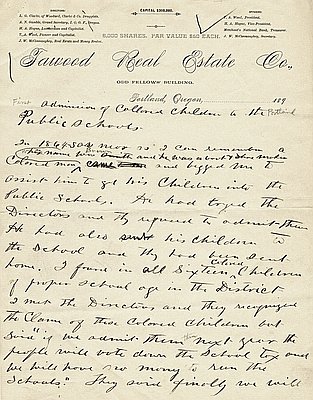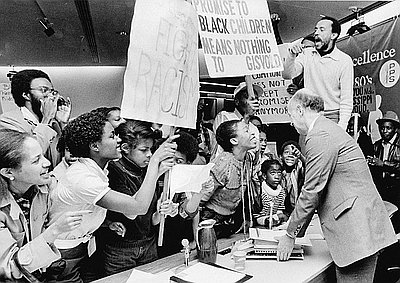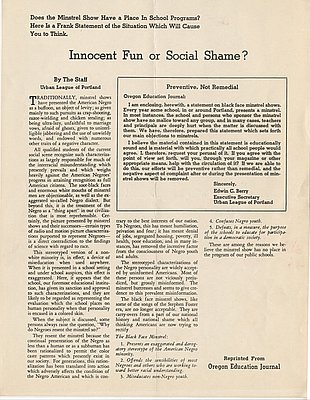- Catalog No. —
- OrHi 95005
- Date —
- March 30, 1982
- Era —
- 1981-Present (Recent Oregon History)
- Themes —
- Arts, Black History, Education, Government, Law, and Politics, Race, Ethnicity, and Nationality
- Credits —
- Oregon Historical Society
- Regions —
- Portland Metropolitan
- Author —
- Steve Nehl, Oregon Journal
African American Community Protests School Board
Black United Front leader, Ron Herndon, stood on a desk at this 1982 protest, leading members of the African American community in chants of “You’d better go home because we ain’t.” It was one of several similar demonstrations against the closure of Harriet Tubman Middle School. In this instance, school board member James Fenwick picked up his papers and left, as they suggested.
Herndon, a 1968 graduate of Reed College, also organized a one-day boycott of the schools by 4,000 African American students to force the school board to allow Tubman to stay open. Leaders hoped that such protests would draw attention to the Portland School Board decisions that avoided addressing the needs of minority and low-income students. The problem was particularly irksome because low test scores plagued African American students.
In the 1960s and through 1979, the Portland school board responded to education issues related to Blacks by following the blatantly racist busing practices. Mandatory busing to distant schools affected African American students who often traveled far from their homes to attend integrated schools; white students attended their closest neighborhood school. With busing, however, test scores did not improve significantly and continued to be a source of frustration for Herndon and other members of the community.
Since his Reed College days, Ron Herndon has drawn persistent attention to educational inequities in Portland. Among his recent accomplishments are directing the Albina Head Start program and co-leading the Education Crisis Team, a citizen group that confronts the Portland School Board over the issue of low academic achievement among low-income and minority students.
In 2002, the Portland Tribune revealed that because of his activism Herndon was one of many activists on whom the Portland Police intelligence unit kept watch throughout the 1970s and 1980s. The intelligence unit maintained and updated these files long after it became illegal for them to do so.
Written by Trudy Flores, Sarah Griffith, © Oregon Historical Society, 2002.
Related Historical Records
-
"Admission of Collored [sic] Children to the Public School"
Thomas Alexander Wood (1837-1904) was a white Oregon pioneer, a veteran of the Indian wars, and a Methodist clergyman. In these reminiscences he recalled the aid he provided …

-
Ron Herndon
(1946-) Ron Herndon is a long-time activist for minority rights and educational opportunities in Portland. Born in Kansas, Herndon arrived in Portland in 1968 to attend Reed College, …

-
"Innocent Fun or Social Shame?"
This document was created for school administrators by the Urban League of Portland sometime in the 1950s in an effort to stop minstrel, or blackface, productions in schools. …

